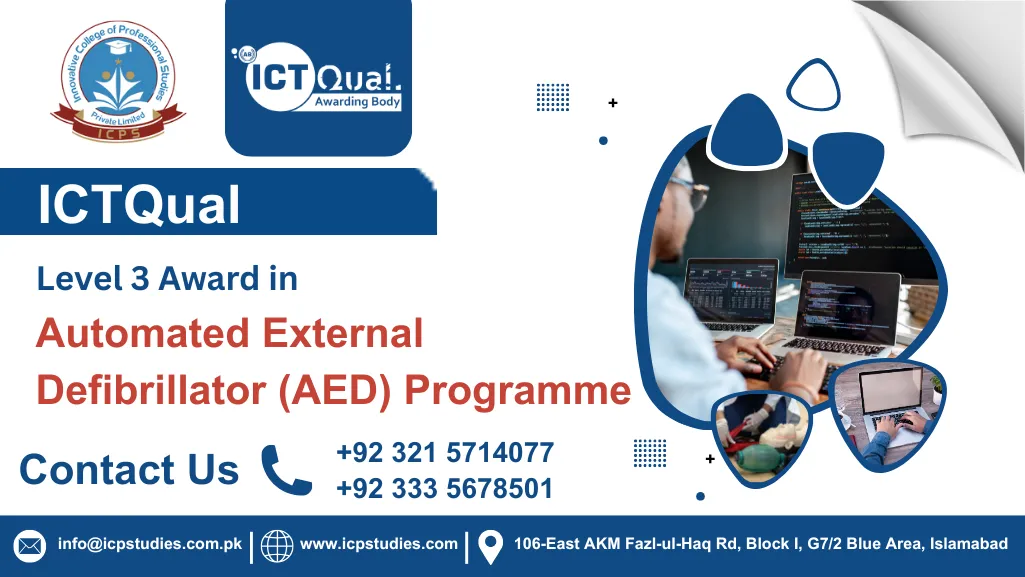The ICTQual AB Level 3 Award in Automated External Defibrillator (AED) Programme is a comprehensive qualification designed to equip individuals with the essential skills and knowledge to effectively use an AED in emergency situations. ICTQual AB Level 3 Award in Automated External Defibrillator (AED) Programme is ideal for those seeking to enhance their emergency response capabilities, whether in the workplace, community settings, or as part of a broader first aid training programme.
Throughout the ICTQual AB Level 3 Award in Automated External Defibrillator (AED) Programme, learners will gain a thorough understanding of how to assess emergency situations, perform CPR, and operate an AED safely and efficiently. The ICTQual AB Level 3 Award in Automated External Defibrillator (AED) Programme includes both theoretical knowledge and practical exercises, ensuring that participants are well-prepared to respond confidently and competently during cardiac emergencies.
Upon successful completion of ICTQual AB Level 3 Award in Automated External Defibrillator (AED) Programme, learners will receive a nationally recognised qualification, validating their ability to provide life-saving assistance in critical moments. ICTQual AB Level 3 Award in Automated External Defibrillator (AED) Programme not only enhances personal competence but also contributes to creating safer environments by ensuring that trained individuals are available to respond to sudden cardiac arrests.
All About ICTQual AB Level 3 Award in Automated External Defibrillator (AED) Programme
Course Overview
The ICTQual AB Level 3 Award in Automated External Defibrillator (AED) Programme is a specialized life-saving qualification designed to equip learners with the essential knowledge and hands-on skills to confidently operate an AED in emergency situations. Sudden cardiac arrest (SCA) is one of the leading causes of death worldwide, and immediate use of an AED, combined with effective CPR, significantly increases the chances of survival.
This course provides participants with a clear understanding of how an AED works, when and how to use it safely, and the vital role it plays in the chain of survival. Learners will gain practical experience in recognizing cardiac arrest, applying life-saving interventions, and ensuring casualty safety until professional medical help arrives.
The qualification is highly relevant for healthcare providers, workplace first aiders, teachers, community volunteers, security staff, and members of the public who may encounter cardiac emergencies. The training is interactive, combining theoretical knowledge with practical demonstrations using AED training devices to build competence and confidence.
By completing the ICTQual AB Level 3 Award in Automated External Defibrillator (AED) Programme, learners demonstrate their readiness to take immediate action in cardiac arrest emergencies. This certification not only strengthens workplace and community safety but also contributes to building a culture of preparedness and life-saving awareness.
Study Units
- Understanding Sudden Cardiac Arrest (SCA) and the Role of an AED
- Operating an Automated External Defibrillator (AED)
- Cardiopulmonary Resuscitation (CPR) Techniques
- Managing Cardiac Emergencies and Post-Emergency Care
To enroll in this qualification, learners are generally required to meet the following entry requirements:
- Age Requirement: Learners must be 16 years or older at the time of registration.
- Educational Background: No formal academic qualifications are required. A basic understanding of English (reading and communication) is recommended to follow instructions and complete assessments.
- Health & Fitness: Learners should be physically capable of performing CPR and AED procedures, as practical demonstrations form part of the assessment.
- Prior Knowledge: No prior first aid qualification is mandatory, but basic knowledge of first aid or CPR can be an advantage.
- Professional Suitability: The course is suitable for workplace first aiders, healthcare assistants, teachers, community workers, security staff, and anyone who may need to operate an AED in an emergency.
This inclusive eligibility ensures that both professionals and members of the general public can gain the confidence and competence to use an AED effectively in life-saving situations.bility ensures that anyone with a responsibility to safeguard others can gain the skills and confidence needed to manage life-threatening anaphylaxis emergencies.ns in health and social care settings.
This qualification is designed for individuals who may be required to use an AED in emergencies involving sudden cardiac arrest. The intended learners include:
- Workplace first aiders and safety officers who are responsible for employee health and safety.
- Healthcare workers such as nurses, medical assistants, and care providers.
- Teachers, school staff, and childcare providers working in environments where AEDs are available.
- Community workers and volunteers involved in public health and safety initiatives.
- Security staff, gym instructors, and sports coaches in facilities where cardiac incidents may occur.
- Members of the general public who wish to gain the confidence and ability to respond effectively to cardiac arrest emergencies.
The programme is suitable for both professionals and non-professionals, ensuring that anyone can become a competent and confident responder in the event of a life-threatening emergency.one who wishes to develop the competence, confidence, and readiness to act quickly and effectively in the event of a severe allergic reaction.
Learning Outcomes
By the end of this course, learners will be able to:
- Understand Sudden Cardiac Arrest (SCA)
- Explain what cardiac arrest is and its common causes.
- Recognize the difference between a heart attack and cardiac arrest.
- Recognize the Chain of Survival
- Understand the importance of early CPR and defibrillation.
- Explain how AED use improves survival chances.
- Operate an AED Safely
- Demonstrate how to correctly operate different types of automated external defibrillators.
- Follow safety precautions to ensure the well-being of both the casualty and responder.
- Perform Basic Life Support (BLS)
- Demonstrate correct cardiopulmonary resuscitation (CPR) techniques for adults, children, and infants.
- Combine CPR with AED use effectively during an emergency.
- Respond to Emergencies
- Assess and manage an unresponsive casualty experiencing cardiac arrest.
- Demonstrate effective communication and teamwork in emergency situations.
- Provide Post-Incident Care
- Describe the steps to take after defibrillation until emergency medical services arrive.
- Understand incident reporting and recording procedures in line with workplace or organizational requirements.
FAQs ICTQual AB Level 3 Award in Automated External Defibrillator (AED) Programme

